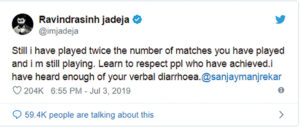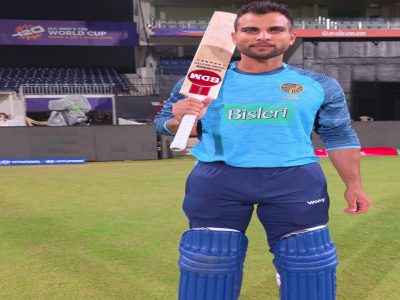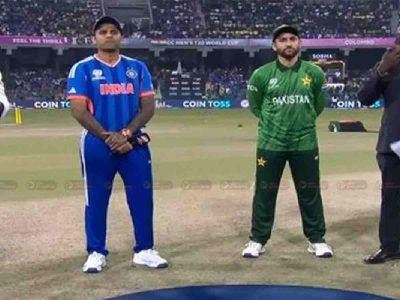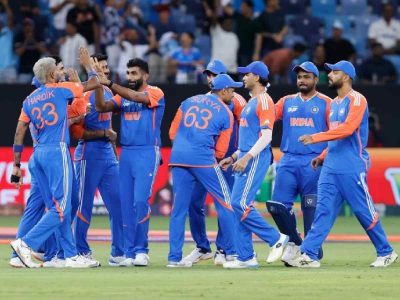Ravindra Jadeja’s Twitter tirade against the former cricketer and one of the most recognisable voices of TV cricket commentary is ominous
At first, it may seem like a harmless social media outburst from a member of the Indian team participating in the ongoing World Cup in England. The problem is that it isn’t. If the past few years are any guide, Ravindra Jadeja’s Twitter tirade against Sanjay Manjrekar, former cricketer and now one of the most recognisable voices of TV cricket commentary, is far more ominous.
Players responding with a certain petulance to criticism by commentators have of late influenced them as broadcasting professionals, but instances of institutional muzzling — like that done by Board of Control for Cricket in India (BCCI) or even international body International Cricket Council (ICC) — can’t escape attention.
“Commentators are being more and more compromised by controlling organisations to the point of censorship,” said Michael Holding, the former West Indies fast bowler and one of the most respected commentators, in his response to ICC following a request to tone down his views on umpiring while commentating on the World Cup.
According to a report in The Guardian, though ICC and Holding have reached a truce and Holding continues on the body’s official broadcast panel for the World Cup, the chain of events preceding it was clear.
“The former West Indies fast bowler described the officiating in last week’s match between West Indies and Australia as ‘atrocious’ on air following a string of on-field errors,” reported The Guardian. This was followed by a strange email from Huw Bevan, the production head at the ICC broadcasting rights partner, Sunset & Vine. In what seemed a curious case of seeing the criticism of dubious umpiring decisions as a threat to cricket’s values, Bevan reminded Holding and some production colleagues of “the importance of maintaining the highest standards and uphold the game’s best values and spirit while covering the tournament”.

In India, such “censorship’’— to use Holding’s word — can be seen in how BCCI has been watchful of Indian commentators’ views about team selection, venues and pitches. Even a highly-respected voice like Sunil Gavaskar ran into trouble because of his critical views that were interestingly seen as ‘dissent’. Mostly on technical aspects, like the DRS, Indian commentators were heard echoing BCCI’s position — as was evident in the Shastri-Nasser Hussain spat in 2011. What, however, has been more problematic is the attitude to criticism directed at individual players or performance of the team.
In dealing with such scrutiny of the team and its players, the attitude of the BCCI and players has sometimes not been different from the volatility of average reactions of social media trolls. Along with criticism, there has also been a view that some of the star cricketers in Indian team are sensitive about uncomfortable questions posed by commentators during post-match presentation and standalone interviews. What, moreover, also surfaced once as a grouse of Indian cricketers is rather baffling — the commentary wasn’t India-centric and focused more on foreign players.
These factors were working in plain sight in 2016 when Harsha Bhogle, a prominent voice of cricket broadcasting in India, was denied a contract after some key players — including Virat Kohli, M S Dhoni and Murali Vijay — had allegedly expressed their displeasure about Bhogle’s commentary during matches and line of questioning in the interviews. The immediate reason, however, in public view was a tweet by film star Amitabh Bachchan obliquely questioning the Indian commentator’s neglect of Indian players in his live commentary during 2016 T20 World Cup.
Here’s what a report in the DNA said in February 2017.
The crux of the matter is that some stars of Indian team, mainly MS Dhoni, Virat Kohli and Murali Vijay felt that the Mumbaikar (Bhogle) used to ask tricky questions during interviews while his commentary was not India-centric during the World T20 held in India last year. Bhogle was indirectly criticised by Amitabh Bachchan who tweeted, “With all due respects, it would be really worthy of an Indian commentator to speak more about our players than others all the time.”
Dhoni who is rarely active on Twitter, immediately retweeted the post and this proved to be a major blow for Bhogle. His contract with Star Sports wasn’t renewed as players reportedly made it clear to BCCI that they won’t be interacting with Bhogle in front of the camera in future.
More than two years later, Sanjay Manjrekar’s seems to be on the target of a current star’s inability to stomach criticism.
Manjrekar had expressed his opinion about how a “bit-and-pieces” player like Jadeja would be a misfit in the final 11 for India in the upcoming key matches.Though a part of the team, Jadeja hasn’t featured in the playing eleven in the ongoing tournament. As India is already using two spinners — Kuldeep Yadav and Yuzvendra Chahal — successfully, Manjrekar’s point was that just because of better batting skills to supplement his left-arm spin bowling, Jadeja shouldn’t find a place even as a utility player.
Given that a few commentators have supported the idea of considering Jadeja for a spot and even India’s batting coach reportedly mulling over the idea, Manjrekar’s view had a contrarian but a cricketing logic to it. One may or may not agree with his assessment but he had a reasoning that was as valid as that of case for including Jadeja.
That’s not how Jadeja saw it. In a tweet which has gone viral since, and fuelled further attack on Manjrekar, Jadeja lashed out.
One doesn’t know how playing a certain number of matches – or not playing – adds to or erodes one’s entitlement to have opinions about a player’s inclusion. Cricket commentary is about grasping cricketing logic, situations, nuances and a bit of the history of the glorious sport. If ‘hearing -from-the-horses mouth’ was made one of the criterion for the validity of a comment, one wonders how poor the rich history of cricket commentary and writing would have been.
One wonders how Jadeja would react to someone like Bhogle, who was never an international cricketer.
That’s not the case with Sanjay Manjrekar. For a very young generation of cricket followers, active on social media, it’s easy to reduce Manjrekar’s chequered international career to cold statistics and mock him with numbers. However, for a different generation, Manjrekar wasn’t just what those numbers say. They hide the fact that in the late 80s and early 90s, he was arguably one of the most technically-accomplished batsmen in the world of cricket. In his approach to technically-correct batsmanship, he was second to none of his generation. Following a brave hundred in India’s Caribbean tour in 1988-89, his consistent high scoring in Pakistan (1989-90) — against an attack led by Wasim, Waqar, Imran and Aaqib — earned him the man-of-series award in the test series in which Sachin Tendulkar made his debut.
His subsequent struggle during Australian tour, and later South African tour, of early 90s was the beginning of a long tragedy which saw India losing one of its most gifted batting talents in the test cricket to inconsistency, self-doubt and perhaps perfectionist obsession. The latter, ironically, also explains a strange appeal he has for a section of fans.
There was a type of melancholic and underachieving Indian in the late 1980s and 90s who watched cricket with an empathy for the struggling career of a technique-obsessed Indian batsman. He wanted Sanjay Manjrekar to succeed but there was something strange that the Mumbai batsman’s invisible admirers wouldn’t like to admit.
In his autobiography, Imperfect, which is refreshing in not being guarded the way memoirs of Indian cricketing greats are, Manjrekar shows cold logic of hindsight and warmth of uncertain emotions in recollecting a past which was neither fulfilling enough to be cherished nor mundane enough to be dismissed. As pointed out in my review of the book, Manjrekar looks back at his years of agonising struggles with perfecting batting technique, fleeting phases of success and finally making peace with career-breaking failures and crippled flight to cricketing fame.
Here, however, it would be more relevant to see how in his post-retirement career as a broadcasting professional, he sought to approach his detached analysis of on-field performances of players. In the last chapter of his book, he talks about things which would sound very relevant to how Jadeja reacted.
“For me to be good at my job, I make a conscious effort to maintain a certain distance with the players so that I can remain clinical in my assessment of their performances. I have not been close to any current player in my eighteen years as commentator. Once you know a cricketer too well personally, things can get complicated. He may tend to get hurt when he hears public criticism of him.” he writes
“Cricketers too, sometimes, talk about how they are okay with constructive criticism. They lie – I was a cricketer myself. I know. As players, you are too sensitive about everything, especially criticism, constructive or otherwise, more so when it comes from a cricketer you played with. Cricketers often have this perception that if an ex-cricketer has some critical observations about his game then he must have a personal grudge. Which is why, strained relationships with players is one of our occupational hazards,” Manjrekar observes.
He goes on to cite how Kevin Pietersen, who had long-standing issues with how commentators were unfair to him, did realise that it wasn’t agenda-driven only when he joined commentary team as a professional after retirement.
Perhaps that’s one of the possible ways in which Ravindra Jadeja can get rid of his misgivings about Sanjay Manjrekar. Cricket followers can wait a few more years for that, Jadeja has certainly few more years of international cricket left in him.
Across continent, Bairstow’s potshots at Vaughan is surely not going to see any exit from commentary box.
In a different set of power dynamics and star system, one can’t be so sure about the implications of a current Indian player’s public outburst against a professional commentator. As someone who was once devoted to correct footwork, playing with straight bat and keeping his head still at the crease, Manjrekar can take this on the chin too.
www.newslaundry.com





